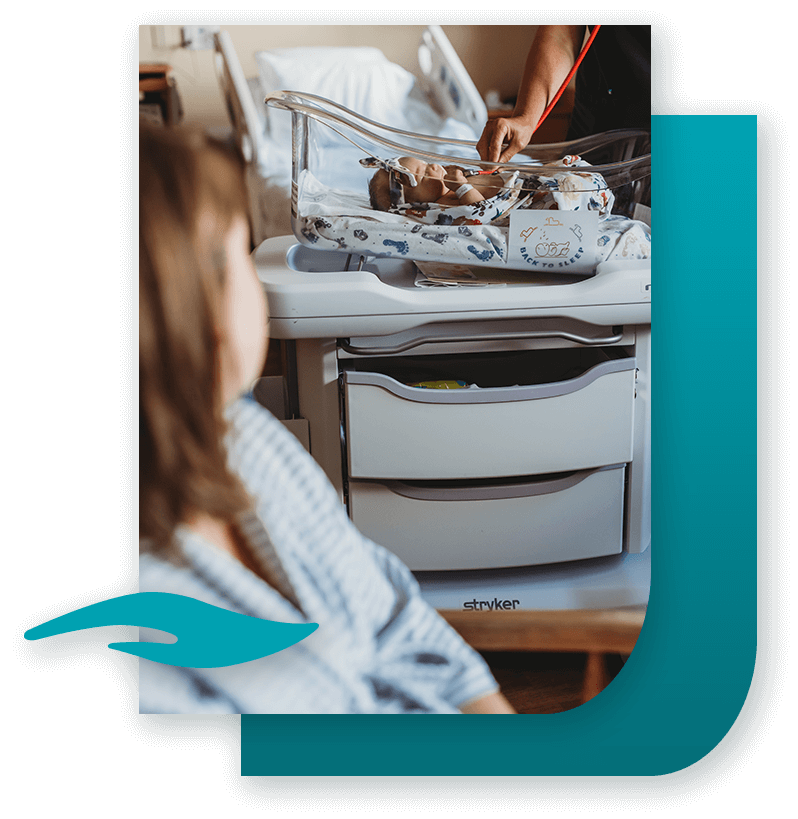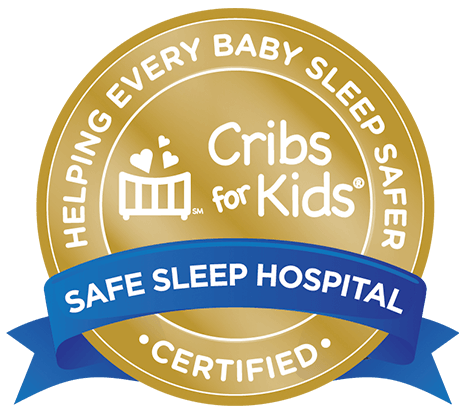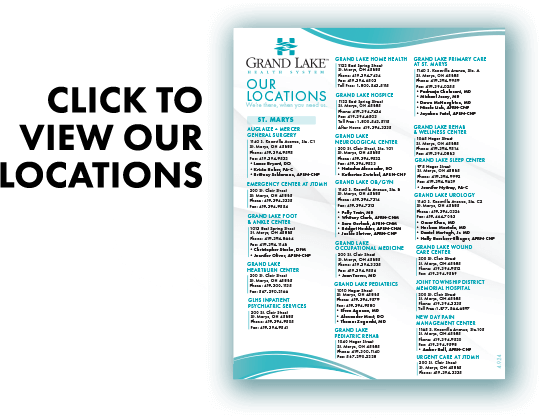
Welcome
to the Birthing Center at Grand Lake Health System
Our mission has always been to provide high-quality, low-cost, sensitive care for the Grand Lake Region. We know there is nothing more special or memorable than the birth of a baby. Our professional, caring staff is dedicated to providing quality care in a safe, comfortable birthing environment.

What to Expect
Labor & Delivery
Once you’re settled into the Birthing Center, the care team will begin by checking your vital signs—such as temperature, oxygen levels, breathing, heart rate, and blood pressure—to establish a baseline and monitor your wellbeing throughout labor. A blood sample will also be taken. To support your care during labor, an IV will be started and kept in place for the duration of delivery. This allows for the administration of medications like pain relief, antibiotics, or drugs to assist with labor if needed. Your baby’s heart rate and your contractions will be tracked using external monitors.
To support the natural progression of labor, you’ll be encouraged to stay active with options like walking, changing positions, or using supportive postures such as squatting or knee-chest. Vaginal checks will be performed periodically to assess how labor is progressing. If desired, you can request an epidural for pain management. While eating is typically restricted, you may be allowed to have ice chips, small sips of liquids, or popsicles. You’ll also be encouraged to empty your bladder regularly, as a full bladder can slow labor.
C-Section
Upon your arrival at the Birthing Center, we’ll begin by taking a blood sample and checking your vital signs, including your blood pressure, heart rate, breathing, oxygen saturation, and temperature. These will be monitored regularly throughout your stay to ensure your well-being. A fetal monitor will be used to keep track of the baby, and an IV line will be started to deliver any necessary medications. This IV will stay in place for at least 24 hours.
In preparation for surgery, your lower abdomen will be cleaned and shaved. Before the procedure begins, both your OB/GYN and anesthesiologist will visit you to go over any questions and explain what to expect. Once you’re in the operating room, anesthesia will be administered, and a catheter will be inserted to keep your bladder empty during the surgery.
After Delivery
In the hours following delivery, your care team will closely monitor your recovery. Vital signs such as blood pressure, pulse, and breathing will be checked frequently at first, then once per shift as you stabilize. Vaginal bleeding and the firmness of your uterus will also be assessed regularly. If you had a vaginal delivery, you can typically return to a normal diet soon after. Blood will be drawn the morning after delivery, and your first trip to the bathroom will be assisted by a nurse. You’ll also receive guidance on how to care for any stitches, and comfort measures like ice packs, sprays, or ointments will be available to ease discomfort. Pain relief is always an option if needed.
For those who’ve had a cesarean delivery, there are a few additional steps in the recovery process. Your oxygen levels, incision site, and dressing will be closely observed. To help prevent complications, you’ll be encouraged to take deep breaths and cough every two hours. A compression device will be placed on your legs until you’re up and moving. Nurses will help you begin sitting up within 12 hours and walking within 24 hours after surgery. Your diet will be reintroduced gradually as your body adjusts.
Newborn Baby
After birth, kangaroo care—skin-to-skin contact—is encouraged for at least an hour or until breastfeeding is complete. Your baby will receive identification and security bands, and any mucus in the nose or mouth will be gently cleared. Standard newborn medications, including eye ointment, Vitamin K, and the Hepatitis B vaccine, will be given. Vital signs such as temperature, pulse, and breathing are monitored frequently at first, then each shift. Blood pressure and weight are checked daily, and umbilical cord care is performed regularly.
Your baby’s first bath will take place after about eight hours, and a hearing screening will be done at or after 12 hours of age. Blood work is typically done the second night. If you choose circumcision, the procedure and aftercare will be discussed with you. The hospital will also help complete paperwork like the birth certificate and Paternity Acknowledgement Form. Car seat testing is done for preterm or low birth weight babies. Most newborns stay at least 48 hours before discharge.
Preparing for Your Stay
Although the hospital will supply many essentials for postpartum and newborn care, bringing a few personal items can help make your stay more comfortable.
Items provided for mom:
- Medications, pads, creams and lotions
- Ice packs and peri bottle
- Toiletries (if needed)
- Breast pump and supplies
- Lanolin ointment for breastfeeding
Items provided for baby:
- Diapers and wipes
- Shampoo, lotion and diaper cream
- Onesies and sleep sacks
Meet Our Childbirth
Team
Quality
We offer the flexibility to choose between experienced obstetricians and certified nurse midwives to support your personalized birth plan. Our skilled nurses use the latest labor techniques and comfort measures to guide you through labor and delivery. If a c-section is needed, our dedicated operating room and 24/7 pediatric and anesthesia teams are ready within the birthing center.
Safety
Your safety is our priority, with advanced technology like central fetal monitoring to track your baby’s well-being during labor. After birth, our Infant Security System and locked entrances ensure a secure environment, with visitors allowed only with your approval. Security cameras also monitor all hallways for added protection.
Comfort
We offer postpartum visits to assess both you and your baby in the days after discharge and address any questions. Our board-certified lactation consultants are available for baby weight checks, breastfeeding support, and concerns. To schedule, call the Birthing Center at 419-394-3335 ext 2419.
Support
We offer postpartum visits to help address any questions or concerns after you go home, with our expert staff assessing both you and your baby. Board-certified lactation consultants are also available for breastfeeding support, including baby weight checks and assistance. To schedule, call the Birthing Center at 419-394-3335 ext 2419.
Education
Classes
Childbirth Education
Our childbirth education classes provide knowledge for you and your support person on what to expect and how to best prepare for the birthing process. Class topics include:
- Stages of Labor
- Labor Stations
- Pain Management Options
- C-Section Birth
- Baby Care
- Postpartum Care
- Pregnancy Warning Signs
- Tour of the Birthing Center
Classes are held monthly on Saturdays from 8:30 AM – 3:00 PM in the Grand Lake Medical Office Conference Room.
Breastfeeding Classes
Our breastfeeding classes prepare you for the rewarding journey of breastfeeding your baby. Class topics include:
- Breastmilk Properties
- How to Position Baby
- Proper Latching
- Interpreting & Understanding Feeding Signs
- Pumping & Milk Storage
- Common Breastfeeding Problems & Solutions
Classes are held monthly from 7:00 – 9:00 PM in the Grand Lake Medical Office Conference Room.
To register for either the childbirth education or breastfeeding classes, please call the Birthing Center at 419-394-3335 ext. 2419 or email OBeducation@jtdmh.org with your name, due date and what class date you are wanting to sign up for. You will receive a reply within 2-3 weeks.
All offers are free to those choosing to deliver at Grand Lake Health System. Pre-registration is required as classes can fill up quickly.
Certified Safe Sleep Champion
Grand Lake Health System achieved the highest certification level of Gold Safe Champion through our commitment to community leadership for best practices and education on infant safe sleep through the development of a hospital policy, staff training, parent education, implementing a wearable blanket program, becoming a Cribs for Kids partner, and a pledge to participate in ongoing audits and community outreach programs.
Click here to learn more about safe sleep.







